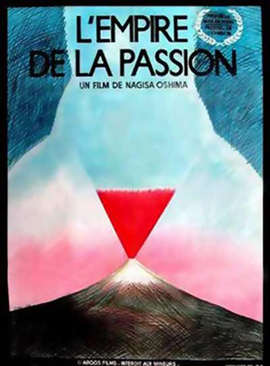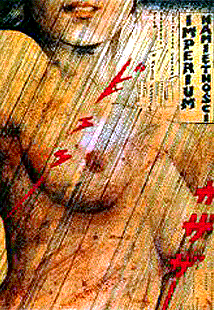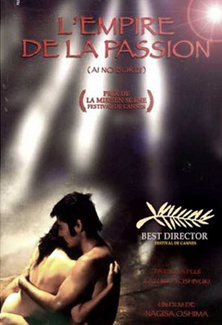My, how we humans can so often let unbridled emotion blind ourselves to reality and better judgment. As a species it seems a necessary facet of our existence; that ever-present conflict between reason and emotion. Love wouldn’t be quite so wonderful, and concurrently so devastating, without it. But there are always consequences when we let emotion get the best of us; when love burns so deeply that it guides our hands to do the most despicable of things. And perhaps no other film depicts this deep-seeded quality of humanity quite as powerfully, elegantly or as downright sinister as Nagisa Oshima’s controversial Empire of Passion.
But there are always consequences when we let emotion get the best of us; when love burns so deeply that it guides our hands to do the most despicable of things. And perhaps no other film depicts this deep-seeded quality of humanity quite as powerfully, elegantly or as downright sinister as Nagisa Oshima’s controversial Empire of Passion.
Oshima, likely better known for his shocking In the Realm of the Senses (a quasi-precursor to Empire), was a controversial writer and intellectual, known for his scathing indictments of Japanese politics and rigid class structure. His films follow as a necessary outlet of this unsettled nature and seek to jam a finger in the eye of conformity and tradition. Ostensibly shunned by much of the Japanese mainstream, Oshima began to make films for a French producer, Anatole Dauman, under whom Oshima’s artistic visions flourished in the late 70’s.
In Empire of Passion, Oshima wraps his story in the veil of an archetypal Japanese Kaidan (a broad term for a ghost or horror story in Japanese culture), but whether this was a deliberate tactic to slyly undermine conventional artistic mores, or a simple exercise in old-school filmmaking is up for debate. One thing is for certain, though – despite the often shocking content in Oshima’s oeuvre, his films are undeniably works of profound beauty, power and import.
Empire of Passion involves a lowly rickshaw driver, Gisaburo, who is away for long hours of the day carting wealthy men around the countryside. His wife, Seki, raises their infant child and works as a maid for the local lord, and is for all intents and purposes a dutiful spouse. That is, until the young soldier Toyoji begins to visit, bringing treats of sweet buns to the much older Seki. Gisaburo is suspicious, and wonders if Toyoji has more romantic plans in mind. Seki brushes these speculations off as silly, but relents when Toyoji does, in fact, make aggressive advances while Gisaburo is away. They become lovers, with Toyoji forcing himself upon an almost reluctantly passionate Seki.

Unable to stomach seeing the married couple together any longer, Toyoji convinces Seki to kill her husband. Seki gets Gisaburo good and drunk and both adulterers take part in his gruesome strangulation. They then dump the body in an abandoned well and soon enough, Gisaburo’s ghost is haunting the town. Things reach a fever pitch when a police inspector arrives to investigate the disappearance. All fingers point to the adulterous couple, with none more condemning than the very hands of the ghost Gisaburo himself.
Perhaps the most striking thing about Empire is how such odd and perverse events take place within such a subtle and beautiful film. The very juxtaposition is fascinating in and of itself. Such can be said of much great art, I suppose, but when it is placed against a background of strict Japanese feudalism it is that much more poignant.
Take for instance Toyoji’s mentally challenged brother. While the brother is not an important character in the overall arc of the film, his role as a key to figuring out Toyoji himself is vital (including a great scene which both brothers run off into the horizon, charging off into an imaginary battle). But for most of his on-screen time the brother simply screeches like a banshee and jumps around like an unkempt monkey. As well, consider another scene in which Toyoji and Seki are alone together, and Toyoji insists Seki shave her pubic hair. We then watch as he does indeed shave her with a straight razor, her face a grimace of discomfort and humiliation. It is a turning point in the film and, while shocking, it is important to establish how the Japanese women of the time bent to even the most degrading desires of the men. You can see how both these instances would not only serve to get under your skin, but demonstrate definite motivations of the director - not existing just to serve shock value in and of itself. Such great filmmaking.
The cinematography and design are stunning. The Criterion presentation is superb, and the small village and countryside where the story occurs truly comes to life in each and every frame. This is especially apparent in the ghost sequences, where an early morning fog suddenly becomes a malignant blanket on the roadways and creeks; where time slows to a near-standstill and we really feel pulled into a spirit-like netherworld. Excellent stuff. And also worth noting is the brooding, ominous score which drones on quietly underneath it all, pulling the whole experience together.

One thing about traditional ghost stories, including most Kaidan, is just how present the ghosts actually are in the physical world. They can touch, feel, eat and…affect the living. I am not sure why, but this part of Empire was vastly unsettling. A ghost is one thing, but a tangible threat that can pop up anywhere is another kettle of fish altogether. There is even one scene where Seki gets into Gisaburo’s ghostly rickshaw, and he gets lost trying to find his way home. He has forgotten the way, he says, with eyes empty and white; his face a blank, forlorn mask.
As a story, the idea that ‘we reap what we sow’ has been a staple of cinema for decades. And certainly the idea of a vengeful spirit within this context is one that has been exploited by the Japanese in recent times to a point of market saturation that is nearly intolerable. But rarely have I seen a work so fascinating as Empire of Passion. It is beautiful, frightening, sometimes disturbing…and spellbinding from start to finish. Criterion has again outdone themselves with this remarkable release.
What to say about Criterion’s treatment of this film that you probably don’t already expect? It is presented in a crisp new digital transfer (1.66:1 aspect ratio), with a beautiful Dolby soundtrack and updated English subtitles (with optional English dubbing).
Included in the supplemental materials:
• A video essay by film historian and critic Catherine Russell;
• Interviews with actors Kazuko Yochiyuki and Tatsuya Fuji, production consultant Koji Wakamatsu and asst. directors Yusuke Narita and Yoichi Sai;
• The U.S. Trailer;
• Plus a booklet with an in-depth essay on Nagisa Oshima by film critic Tony Rayns and an interview with Oshima.

